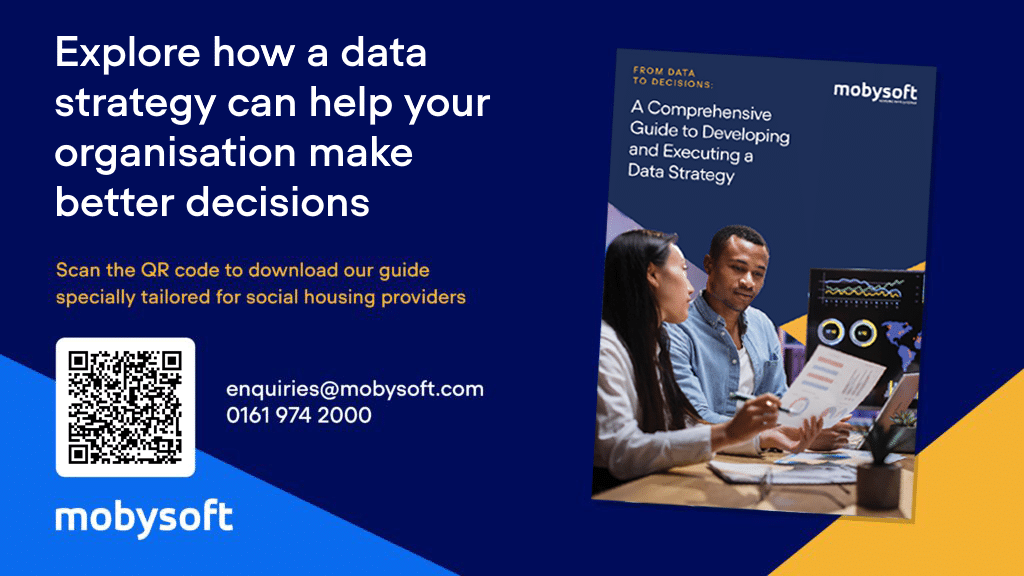How Social Landlords Can Turn Data into Action
Data has been called “the new oil”, but for many social housing providers, it feels more like a blocked pipeline. Mobysoft’s new report, From Data to Decisions: A Comprehensive Guide to Developing and Executing a Data Strategy, lays bare some of the challenges facing the sector, as well as the practical steps that organisations can take to improve.
The report features exclusive polling, conducted with 100 senior housing decision-makers, which shows that in many organisations, there is a lack of trust in the accuracy of data, fragmented systems that don’t communicate, and a culture that’s slow to embrace data-driven thinking. 56% of senior housing staff surveyed said they have had issues with accessing or being provided with records to respond to complaints. With the way in which the sector responds to the concerns of tenants under the spotlight like never before, this is a daunting reality.
Bad data can delay response times, leaving tenants frustrated and landlords scrambling. Ian Kelly, Director of Digital and Innovation at Plus Dane Housing described how his organisation tackled this issue head-on by using complaints data to overhaul internal teams and deliver better service. It’s a reminder that good data, when properly harnessed, can lead to meaningful improvements.
The Importance of Culture
What’s clear from the findings is that the problem isn’t just technical. Over 60% of respondents said their organisation’s culture was a barrier to better data practices. It’s not that housing providers don’t value data, but fostering a mindset where data is seen as a cornerstone of decision-making remains an uphill battle. Without strong leadership to champion the cause, many providers risk becoming stuck in the analogue past while facing demands firmly rooted in the digital present.
And those demands are only intensifying. The Social Housing (Regulation) Act 2023 has raised the stakes with its call for greater transparency and accountability. Housing providers are now required to demonstrate that they can gather, manage, and report data effectively. The message is clear: it’s no longer enough to muddle through. In new interview with Mobysoft ahead of the report, Housing Ombudsman Richard Blakeway starkly warned: “What may appear to be minor or isolated administrative errors actually can lead to profound human consequences and indeed present significant organisational consequences and risks to the landlord”.
Human Impact and Regulatory Risk
The cost of inaction isn’t just measured in human impact and regulatory risk; it’s also financial. Inaccurate data is expensive. It drives up operational costs, hampers efficiency, and strains resources that could be better directed toward frontline services. Nearly half of senior housing staff polled admitted that poor data quality increased costs in their organisations.
Encouragingly, the survey also reveals a sector ready for change. Nearly two-thirds of respondents are exploring AI to drive data improvements, and over half see training and education as critical steps forward. There’s an emerging recognition that data isn’t just a tool for meeting compliance, it’s an opportunity to innovate and create value for tenants. But to seize this opportunity, housing providers must address the fundamentals: establishing clear data governance frameworks, auditing and cleansing their existing data, and investing in scalable infrastructure that can adapt to future needs.
Clear Priorities and Digestible Actions
Leadership is crucial. Without buy-in from the top, even the best data strategies risk gathering dust. Leaders must not only allocate resources but set the tone for a culture that values accuracy, accountability, and innovation. It’s about creating an organisation where data isn’t just collected – it’s trusted, shared and used to make better decisions. As Jason Wickens from the Disruptive Innovators Network puts it: “Clear priorities and digestible actions ensure progress over time”.
The current state of data management in social housing is undeniably challenging, but it’s not without hope. There’s a growing appetite for improvement, supported by tools, technologies, and a better understanding of what’s at stake. Housing providers who embrace the shift from reactive problem-solving to proactive decision-making stand to reap the rewards: stronger regulatory compliance, greater efficiency, and most importantly, better outcomes for tenants. Data might not be a silver bullet, but for a sector facing complex pressures, it’s as close as it gets.
If your organisation isn’t currently making the most of its data to improve tenant outcomes, meet regulatory demands, and enhance operational efficiency, then download Mobysoft’s Free Guide: From Data to Decisions – A Comprehensive Guide to Developing and Executing a Data Strategy. It’s packed full of useful, actionable insight designed to start social housing providers off on the right foot when embarking upon their journey towards data-driven decision making.

- How Social Landlords Can Turn Data into Action - February 12, 2025
- Autumn 2024 Budget Response: Implications for the Sector & Analysis - October 31, 2024